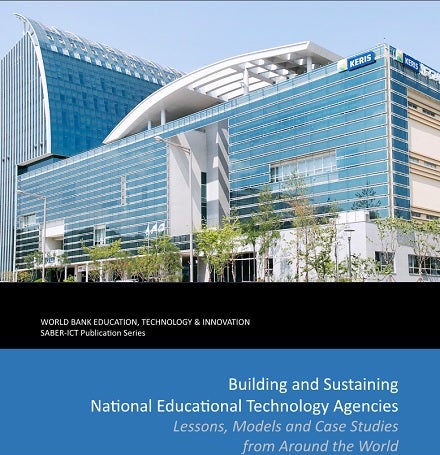
For over a decade, the World Bank and the Government of Korea have enjoyed a strong strategic partnership exploring a wide range of issues related to the use of information and communications technologies (ICT) in education around the world.
One high profile activity under this partnership is the annual Global Symposium on ICT use in Education (GSIE), which has helped to establish Korea as a global hub for insight, knowledge sharing and networking for high level government officials, practitioners and experts around topics related to the use of new technologies in education.
GSIE organizers planned from the beginning to support knowledge exchanges around a few ‘evergreen’ general topics (e.g. like the use of new technologies to support teachers; monitoring and evaluation; and digital competencies for learners) in which KERIS, Korea’s national educational technology agency, has notable experience and expertise.
What organizers did not initially anticipate, however, was the extent to which policymakers were interested not only in learning about what KERIS itself knew, and was learning, about uses of new technologies in education, but also in learning about the institution of KERIS itself – as well as institutions like it.
As it happened, people responsible for starting, leading and/or overseeing national institutions in their countries which performed similar sorts of functions to that of KERIS increasingly made the trek to Korea to participate in the GSIE (as they are doing this week), sharing information and insights with their counterparts about national institutions emerging in countries around the world to help introduce, support, fund, share information about, and evaluate the use of ICTs in education at a large scale.
A new World Bank publication, Building and sustaining national educational technology agencies: Lessons, models and case studies from around the world, attempts to document, analyze and take stock of this phenomenon:
- Gavin Dykes and I begin by providing a general overview of the phenomenon of national educational technology agencies, drawing heavily on the case studies that follow.
- Youngsun Kwon and Sanghyun Jang then tell the story of the founding and initial years of KERIS in Korea, which has served as a model for numerous other national educational technologies agencies around the world, and examine Korea's Cyber Home Learning System.
- Molly N.N. Lee and Soon Seng Thah examine the founding and evolution of the much-admired Malaysian Smart School Initiative, paying special attention to Malaysia's Smart School Qualification Standards (SSQS).
- Gavin Dykes explores the case of Becta, the British educational communications and technology agency, which was considered by many practitioners to be one of the world's best examples of a national educational technology agency -- at least until the institution itself was closed down.
- Eugenio Severin analyzes the evolution of Chile's Enlaces program, which grew from a small pilot project overseen at a university to encompass all schools across the Chilean education system.
- Edmond Gaible and Anush Shahverdyan trace the growth of the National Center for Education Technology (NaCET) in Armenia, which was formed to help meet the technical needs of the Ministry of Education related to the rollout of computer equipment and connectivity in Armenian schools.
- Eugenio Severin then looks at the case of Plan Ceibal in Uruguay, which helped that small South American country become the first in the world to provide every student with a free laptop and connect all of its schools to the Internet.
- Neil Butcher and Petra Bodrogini explore the establishment and changing role of PUSTEKKOM in Indonesia, the Centre for Information and Communication Technology (ICT) for Education originally created in the late 1970s to help lead some of that vast country's efforts in distance education.
- Carla Jimenez Iglesias examines Costa's Rica's Omar Dengo Foundation, which established as a private institution by government to explore and support the use of new technologies in schools, explicitly complementing that country's Ministry of Education.
- Saowaruj Rattanakhamfu looks at the case of Schoolnet Thailand and its emergence out of another institution, NECTEC. She documents how an initial effort overseen within the Ministry of ICT that benefited from the expertise from a number of leading academics eventually was absorbed as an ongoing program of that country's Ministry of Education.
- Benjamin Vergel De Dios analyzes the particular case of the Philippines in 2012, where no institution existed that performed the functions typically associated with a national education technology agency. He highlights challenges and issues in a country seeking to introduce ICTs in its schools without the sort of coordinating institution common to many other countries.
- Gerald White and Lesley Parker examine the case of EdNA in Australia, analyzing a national education technology agency (many of whose key functions were 'virtual') from birth through its growth and maturation to its eventual demise.
- I conclude the publication by quickly identifying a number of additional institutions not explicitly examined in the book, but which might offer additional lessons for consideration.
It is hoped that sharing this information publicly may help to catalyze interest in documenting and exploring the experiences of such national educational technology agencies, which play increasingly key roles in activities that are growing in strategic importance (and cost!) in many countries, but which have to date been the subject of little critical and academic interest outside their host countries.
This publication was produced as part of the SABER-ICT initiative and was supported by funds
from the Korea – World Bank Partnership Facility (KWPF)
You may also be interested in the following posts from the World Bank’s EduTech blog (some of which served as rough drafts for material that was eventually included in this book):
- The Development and Evolution of National Educational Technology Agencies Over Time
- Why Establish a National Educational Technology Agency?
- Learning from national ICT and education agencies
- Building national ICT/education agencies
- Questions for policymakers seeking to create or restructure a national educational technology agency


Join the Conversation